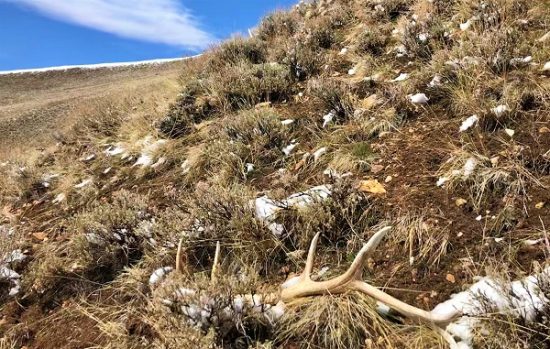
Game Managers Urge Antler Seekers To Avoid Stressing Winter-weakened Deer, Elk
THE FOLLOWING IS A PRESS RELEASE FROM THE IDAHO DEPARTMENT OF FISH AND GAME
As anxious shed antler hunters prepare to take to Idaho’s hills in search of fresh bounty, the Idaho Department of Fish and Game urges them to avoid stressing wildlife trying to survive the late winter storms.
Shed antlers from deer, elk and moose are commonly found in areas where they spend the winter months. Typically, mule deer and moose shed in late December through January, and elk shed from mid-winter through April.

While there are no seasons directly related to shed hunting in Idaho, unfortunately, many take to the field to gather antlers during the worst time of the year for the animals.
Wintering big game animals are very susceptible to any kind of disturbance whether it is from passing motorists, domestic dogs, predators or shed hunters in late winter and early spring. There is growing concern over shed hunters putting additional stress on wintering big game in many areas of the state, especially in areas that have seen more severe winter weather this year.
“Above average snow depth and crusting due to freezing and thawing is already starting to show its effects on deer fawn survival, and any added stress will only multiply the loss,” said Dennis Newman, Salmon Region wildlife manager.
At this time of year, deer and elk rely on their body reserves and what little nutrition they can get from surrounding vegetation. Any extra movement an animal makes costs energy and that depletes the little energy it has left. Energy depletion can lead to sickness and oftentimes death, especially for fawns and calves at this critical time of year.
A significant portion of fawn mortality occurs in March, and some animals may be pushed over the edge unintentionally by the very people who want to see them during the fall hunting seasons.
As winter snow and cold temperatures continue, shed hunters can alleviate potential negative impacts to big game by following these simple steps while still enjoying their sport:
Delay your search. Shed hunters are urged to delay their search until late spring, well after big game herds leave their winter range. Displacing big game animals from their winter range and repeated disturbance during the most critical part of the year can have dire consequences. A single instance of human disturbance alone may not be that disruptive to animals already stressed by winter, but consider several days of human disturbance.
Watch from a distance. Modern optics provides the ability to watch wildlife from great distances. Use them and you will be much more likely to pick up sheds later and the animal will be better off.
Respect private lands and follow all road and area restrictions. Like all outdoor recreationists, antler hunters must secure landowner permission to cross or look for antlers on private land. In addition, they must abide by all travel restrictions on federal and state public lands. Keep in mind that some public lands are closed temporarily to motorized access during the winter months and early spring to provide security areas free of disturbance. In the Salmon area, this includes public lands in the Agency Creek- Warm Springs area, and other areas identified on BLM and Forest Service travel plan maps. For questions about travel management plans or areas managed for wintering wildlife, contact your local U.S. Forest Service, Bureau of Land Management, or Fish and Game regional office.
Park and walk. Do not take motorized vehicles off designated roads and trails – travel by foot or horseback instead. Not only is off-road travel illegal in most areas, but substantial fines are issued to those that don’t follow the laws. In addition, even if motorized access is allowed on designated roads and trails, shed hunters should seriously consider the potential impact to wildlife and damage they may cause to saturated roads. Keep in mind that just because you can drive somewhere doesn’t mean you should.
Keep dogs under your control. Though your dog may not chase deer or elk, its presence alone may be enough to cause animals to expend unnecessary energy they would not have otherwise used. To deer and elk, a dog is a predator and the impacts of free-running dogs on withering game can be substantial. Remember, it is illegal to allow dogs to chase or harass deer and elk.
Can I keep it? Shed antler hunters can only lawfully possess antlers that are shed naturally from big game, from animals that have died of natural causes or from a road kill as long as the person completes the self-issued Salvage Permit available at https://idfg.idaho.gov/species/roadkill. The horns of bighorn sheep that have died of natural causes may be recovered but may not be sold, bartered or transferred to another person without a permit from Fish and Game. Bighorn sheep horns must be permanently marked with a metal pin at an Idaho Fish and Game regional office within 30 days of recovery.
Keeping these points in mind when shed hunting will ensure that undue stresses on animals will be avoided or minimized. Some thought and consideration ahead of time can greatly minimize your impact on local wintering wildlife herds and increase your enjoyment in the field.




